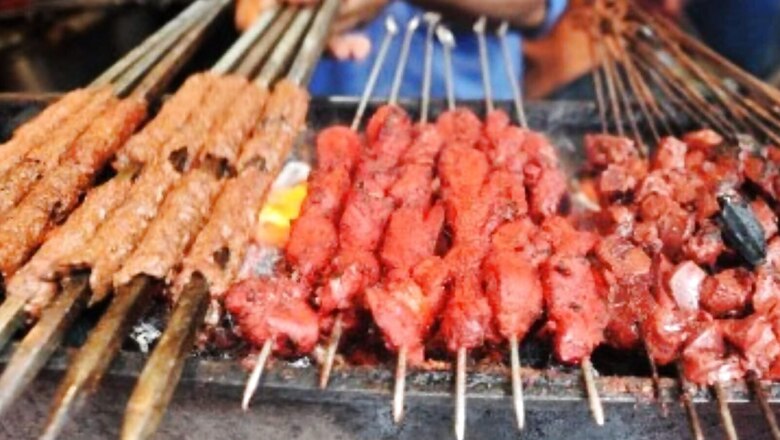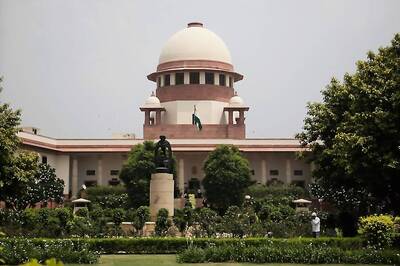
views
After Ahmedabad became the latest city in Gujarat to ban roadside stalls selling non-vegetarian food, chief minister Bhupendra Patel has clarified that the BJP-ruled government in the state has no issues with the different food habits of people. Five out of eight BJP-ruled municipal corporations in Gujarat — Ahmedabad, Bhavnagar, Rajkot, Junagadh and Vadodara — have announced that they will take action against vendors selling non-veg foods on busy roads.
While there is no such announcement by Gandhinagar and Surat urban bodies, Jamnagar mayor Binaben Kothari invited suggestions from corporators on the issue. Rajkot mayor Pradip Dav was the first to announce that vendors of non-veg foods, including egg dishes, will be removed from the main roads to decongest them.
Civic bodies, however, do not want these food stalls to be in full public view and have listed some reasons behind the action. They have directed vendors to either stop selling non-vegetarian fare or to cover them so people cannot see the food items.
However, there are no official notifications for these orders but civic officials have been orally directed to ask these roadside eateries not to sell non-vegetarion and egg items.
Here are the top five reasons why Gujarat is banning non-vegetarian food stalls from public view:
“LAND GRABBING” AND ENCROACHMENT: After Rajkot and Vadodara municipal corporations banned roadside eateries selling eggs and non-vegetarian food on November 19, Gujarat revenue minister Rajendra Trivedi had said such kind of businesses were an act of “land grabbing” of temporary nature, and that strict action should be taken against such encroachment. He had also said such orders will be issued in other cities as well.
Trivedi said, “This has been an issue since a long time. This is also land grabbing, even though of temporary kind I congratulate the Rajkot mayor as well as the Vadodara mayor for such decisions.”
NO NON-VEG NEAR SCHOOLS AND RELIGIOUS PLACES: The BJP-ruled Ahmedabad municipal corporation has decided to remove non-veg food stalls from operating within 100 metres of schools, colleges and religious places.
UNHYGIENIC, HEALTH HAZARD, FOUL SMELL: Chief minister Bhupendra Patel said action can be taken against street food carts that are selling “unhygienic” food, and that there have been demands to remove particular ‘larries’ (carts) from the road. “Our only concern is that, the food sold from food carts should not be unhygienic,” Patel said, addressing a BJP programme at Bandhani village in Anand district.
TRAFFIC OBSTRUCTION: Patel said local civic bodies take decisions on removing food carts if they hamper road traffic. “Local municipal corporations or municipalities take decisions to remove food carts. They can do so if they are obstructing traffic on city roads,” he said.
HURTING RELIGIOUS SENTIMENTS: Trivedi, on the sidelines of a programme in Vadodara, said, “…such kind of eateries not only play with the sentiments of some people, but it also causes inconveniences to the commuters as the spicy fragrance and flavours cause discomfort to the eyes.” People were also complaining about the presence of non-veg food vendors near religious places, he added.
“This is not a caste or religion issue. Religion is immaterial. Whoever is selling such kind of dishes should buy a shop and do the business is over there,” he said.
Action against both veg, non-veg food stalls?
After controversy erupted over asking non-veg food stalls to stay off roads, civic bodies in Ahmedabad, Bhavnagar and Rajkot cities, however, claimed that it was not just non-vegetarian food stalls that were being asked to stop sale, but that action was also being taken against vegetarian food stalls. The Ahmedabad municipal corporation said it had started an anti-encroachment drive from Vastrapur Lake area, a busy street-food hub which bustles with customers from evening till late in the night.
“AMC officials have launched a drive to remove street vendors who are obstructing traffic and people’s movement. It covers vendors of both veg and non-veg food. There is no discrimination. We will take action against everyone who blocks roads,” said Devang Dani, chairman of the AMC’s Town Planning and Estate Committee.
Assistant municipal commissioner of the New West Zone Hardik Thakor said several street carts which obstructed traffic were removed from the area. “Not just non-veg, we have removed handcarts selling vegetarian foods too,” he added. Corporators and local leaders of Asaduddin Owaisi’s All India Majlis-e-Ittehadul Muslimeen staged a protest at the AMC’s headquarters and demanded the poor should not be harassed and the drive should be stopped.
Even as public executives in civic bodies demanded the removal of such food stalls, the BJP is divided over the issue. State BJP president CR Patil said it was not necessary that the order would be replicated everywhere. According to a report in The Indian Express, Patil has instructed city mayors not to take coercive action against roadside non-vegetarian food stalls. He was quoted as saying, “Everyone in this country has the liberty to decide what to eat. It is not appropriate to remove a person selling non-vegetarian food on a cart if people are buying from him. There is no such provision in the law either. People are free to sell anything that is not prohibited. So, there is no question of removing carts (from roads).”
Brief history of food habits in Gujarat
The revenue committee chairperson of Ahmedabad municpal corporation, Jainik Vakil, had written to the municipal commissioner and the standing committee to ban the sale of non-vegetarian food on roads. Vakil had invoked Gujarat’s “identity” and “cultural tradition” as the basis of his demand.
In 2014, Palitana under Bhavnagar district was the first city in the world to be declared completely vegetarian. The small city is a holy destination for the followers of Jainism. The decision to declare the city vegetarian was made after massive protests by Jain monks demanding that 250 butcher shops be shut down.
Gujarat has long pushed for vegetarianism, seeing as Mahatma Gandhi also believed in the concept. The Mahatma, however, was not vegetarian in his habits earlier as a student. It was only after he returned to India that he became completely vegetarian due to his Hindu Vaishnavite parents’ food habits. Hence, being vegetarian is a sign of being highly pious in Gujarat.
However, despite having a history of being touchy about food habits and choices, Gujarat is not the most vegetarian state in the country. According to government data, Gujarat has a high population of Hindus, who make up around 88.5 per cent, while Jains make up 1 per cent and Muslims and Christians together make up 10 per cent.
Data shows that 40 per cent Gujaratis eat meat, and that meat production has only grown in the state over the years. Government data also suggests that a large part of this meat is consumed in the state.
Rajasthan is the most vegetarian state in India, followed by Haryana and Punjab. All three states have larger vegetarian populations than Gujarat.
(With PTI inputs)
Read all the Latest India News here

















Comments
0 comment